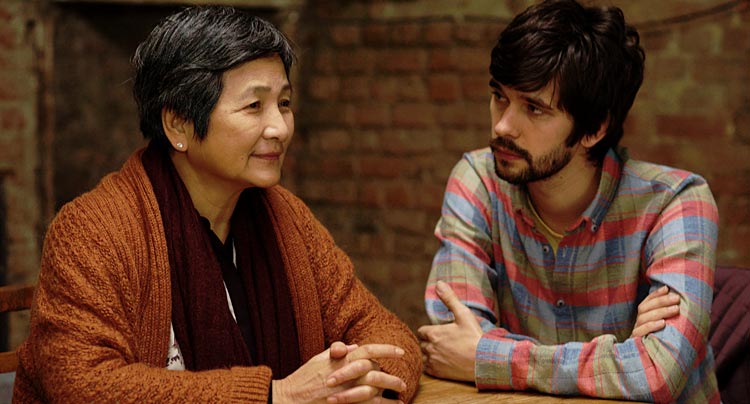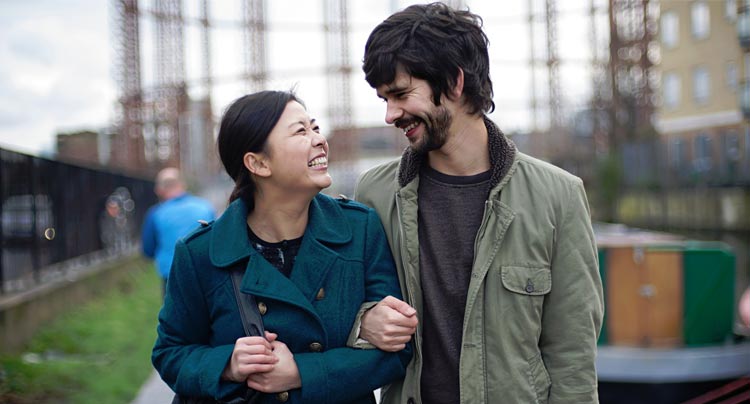
An emotional examination of the relationship between a man and his dead lover’s mother.

An emotional examination of the relationship between a man and his dead lover’s mother.
Almost every film review I have written has opened with an introduction relating to the film at hand, whether it be an anecdote or a trivia item about awards, news, or details relating to the film. In the case of Lilting, my introduction is left blank thanks to a film so unique and so beautifully executed that I struggle to find a comparison.
The film, from writer/director Hong Khaou, centers on Junn (Pei-pei Cheng), an older Cambodian Chinese woman who has recently lost her son. (She is also a widow.) Junn lives in modern-day London, having emigrated years before with her husband and son. Having never learned the English language, Junn struggles in her solitary life in the retirement home where her son placed her.
Before long there is a new force in her life: Richard (Ben Whishaw), a man she believed was her son’s “best friend” but who, in actuality, was her son’s lover. While nothing can compare to the loss of a child, Richard’s pain of having lost the love of his life is no less crippling to him than Junn’s loss is to her.
Another new force in Junn’s life is Alan (Peter Bowles), an Englishman and fellow retirement home denizen who has romantic interests in Junn – and she in him – despite their language barrier. Where she is bored and restless in the home, Alan is comfortable there.

The third new force in Junn’s life is Vann (Naomi Christie), the interpreter Richard hires to help Junn communicate with Alan. Vann is a pretty, 20-something Asian girl who is tasked with so much more than converting English to Chinese and back again. She is a bridge between languages and cultures and ages. She has the thankless job of providing a voice for everyone else, yet when she tries to assert her own, she finds deeper communication is not necessarily her strong suit, at least in her current situation.
The first 10 minutes of Lilting are devastating. The film opens with a scene with Junn and her son, Kai (Andrew Leung), who is visiting her at the home. She’s your typical mom: she loves that her son has come to visit (but he doesn’t come often enough); she loves that he brings her flowers (but not the CD he keeps forgetting); she wishes she could see him more (and that he would be less generous of his time with Richard). It’s as genuine a mother-son exchange as you are likely to see … until Kai disappears. He is not in Junn’s room, but instead in her mind.
Thanks to some terrific shot selections and tight blocking by director Khaou, coupled with excellent editing by Mark Towns, a camera trick that in many other films is executed heavy-handedly instead leaves the viewer breathless.
Kai – who is dead when the story begins – exists like this throughout Lilting. Khaou treats us to these deftly woven flashbacks of Kai and Junn, and Kai and Richard, to paint a portrait of who this young man was in the eyes of his mother and in the eyes of his lover, how those two visions of Kai conflicted greatly, and how the conflict escalates in the wake of his death.
Beyond the battle for Kai’s memory (and his things, and his ashes), Junn and Richard carry mild sentiments of bigotry towards each other. Richard carries it in the form of his frustration that Junn never assimilated to her western surroundings. Junn carries it in the form of sexual discrimination. While she never admits to knowing her son was gay, and while there is a moment near the end of the film when Richard outs Kai posthumously, you get the sense she has always known it in her heart, and she has always resented it in her heart. Hers is a jealousy more than that of the usual possessive mother losing her son to his love; it’s a jealousy tinged with old-world discriminatory attitudes. It’s deft character creation from Khaou that both actors pull off remarkably well.

Much of the rest of the film’s conflict is more easily defined but no less important: East vs. West. Old vs. Young. Man vs. Woman. Straight vs. Gay. Richard and Vann face there own strife as Vann’s personal feelings come to play regarding the job she’s been hired for. What makes Lilting so successful is the balance of these conflicting situations. There is never a moment in the film when Khaou rests too heavily on something that feels like it’s working well; he knows to not abuse a good thing.
Khaou adds some needed comic relief and always at the right time – mostly from Alan, who gets the film’s funniest lines. The jokes don’t always work, but they never feel forced, which is more important here. These aren’t tension-breakers delivered solely for the sake of lightning the mood; they are light lines delivered with pinpoint timing.
Hong Khaou is a gifted storyteller and filmmaker who captures well the complexity of relationships, how challenging they can be, their causes and effects, and what motivates people to operate both within and beyond them. Lilting is delicate and intricate and a genuinely satisfying viewing experience.